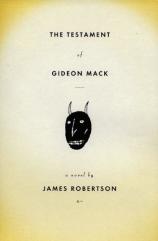Reading Group Guide
Discussion Questions
The Testament of Gideon Mack

1. Nancy Croy says, “When I think of all the novels I’ve read, I do wonder if it’s been a sensible use of my time. Why would I fill my head with all those made-up stories if it wasn’t to try and understand my own story? Every month my book group discusses a novel and its characters as if they were real people making real choices. Life is a story” (p. 220). Is Nancy right in thinking we read novels chiefly to understand our own stories? Why do we tend to talk about fictional characters as if they were real people? In what ways is life itself a story?
2. In his introduction, the publisher Patrick Walker writes that Gideon Mack’s story, “though some may dismiss it as a tissue of lies or the fantasy of a damaged mind, is a genuine document with its own relevance for our times” (pp. 3–4). What is its relevance for our times?
3. How does the narrative frame of the novel affect the way we read it?
4. Most of the people in the town believe that Gideon went mad during the three days he was lost in the Black Jaws and that his story about meeting the Devil is either a delusion or a lie. Why do they feel this way? Why is it impossible for anyone other than Gideon to believe that he actually met the Devil? What concrete evidence seems to support his story? Why do those who assert that God exists and the Devil is real consider anyone who claims to have seen either one to be insane?
5. After many years of dishonesty in his religious life—playing the role of a minister while disbelieving in God—why does Gideon feel so compelled to tell the truth about his meeting with the Devil? How does the Devil affect Gideon’s ideas about salvation, redemption, and the afterlife?
6. The Devil tells Gideon that he feels sorry for God, that when things are going well people forget about him. “They unchain the swings, turn the churches into casinos and mock anybody who still believes in him. He’s a very easy target. And who does he get left with? Fanatics and maniacs of every faith and every persuasion, who want to kill the heretics and blow themselves to pieces in his name” (p. 295). Discuss this argument about how religious belief manifests in our time. Do you find it convincing?
7. In what senses is Gideon Mack’s story a “testament”?
8. Gideon’s father, James Mack, asserts that “stupidity is rife in this world, and its wellspring is the United States of America” (p. 117). Why does he despise the United States so intensely? Is he right in suggesting that the pursuit of happiness leads to misery? Does it do so for characters in the novel?
9. What is the symbolic or mythic significance of Gideon’s “subterranean journey” through the Black Jaws? In what ways does it change Gideon? Are these changes positive or negative?
10. Gideon’s wife asks him, “Can you be dishonest in one part of your life but not another?” (p. 155). In what ways does Gideon’s dishonesty about his faith affect the rest of his life? What ironies are involved in the fact that it is Gideon’s honesty about his meeting with the Devil that makes everyone think he’s gone insane?
11. Gideon learns early on, from his strict religious upbringing and his parents’ example, that passions should be muzzled. How does this emotional repression affect the rest of his life?
12. Gideon says he knew that the stone “was a sign” but that he’d had “no idea what it meant” (p. 341). What does the stone signify? How does it change Gideon’s life?
13. What makes Catherine Craigie such an admirably eccentric character? Why is she so likable in spite of her abrasive manner?
14. What does The Testament of Gideon Mack as a whole suggest about the role of religion in our lives? What different views of religion do Gideon, Gideon’s father, Peter MacMurray, Lorna Sprott, John Moffat, Catherine Craigie, and the Devil express? Does the novel seem to endorse one of these views over the others?
The Testament of Gideon Mack
- Publication Date: March 22, 2007
- Hardcover: 400 pages
- Publisher: Viking Adult
- ISBN-10: 067003844X
- ISBN-13: 9780670038442






